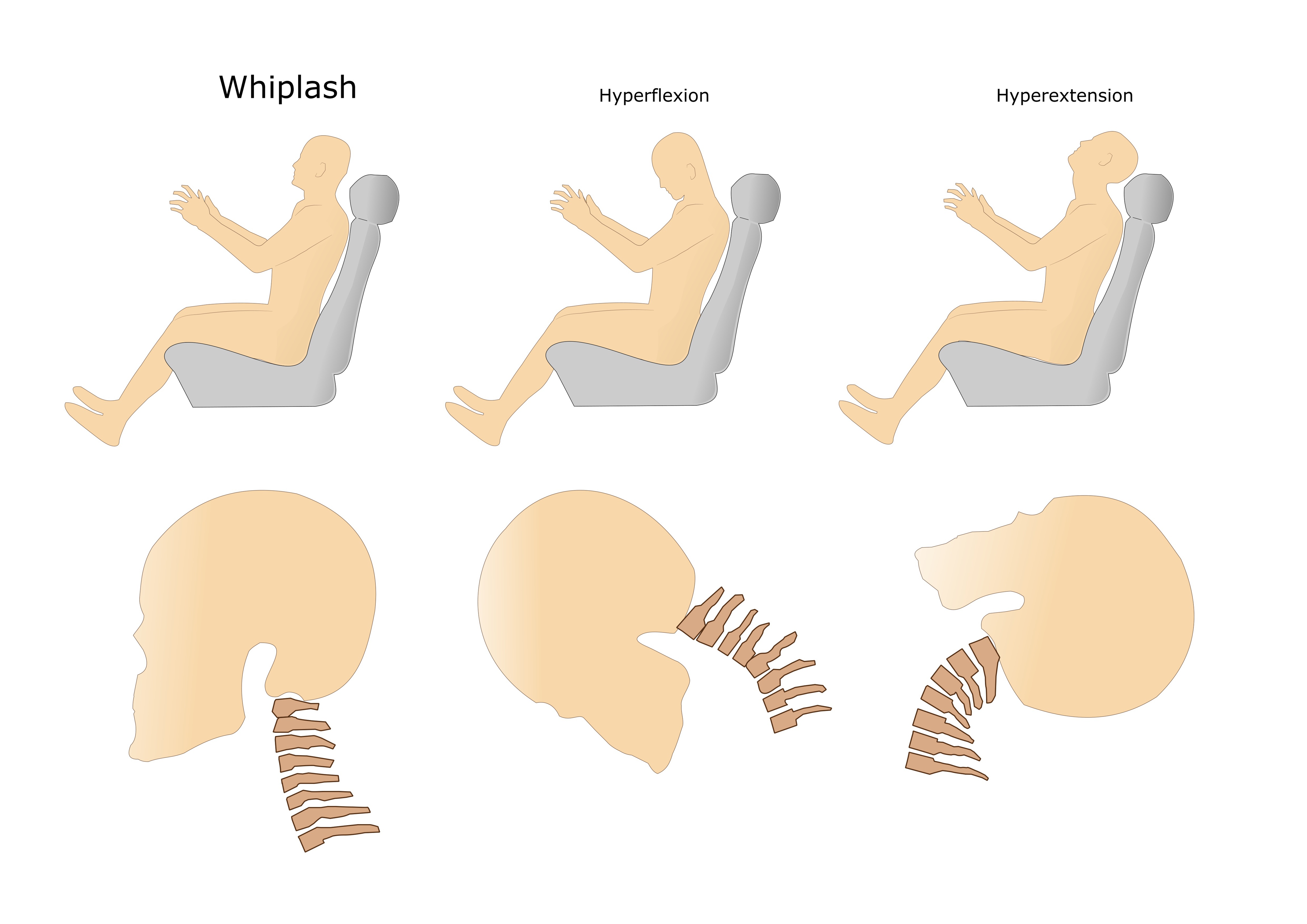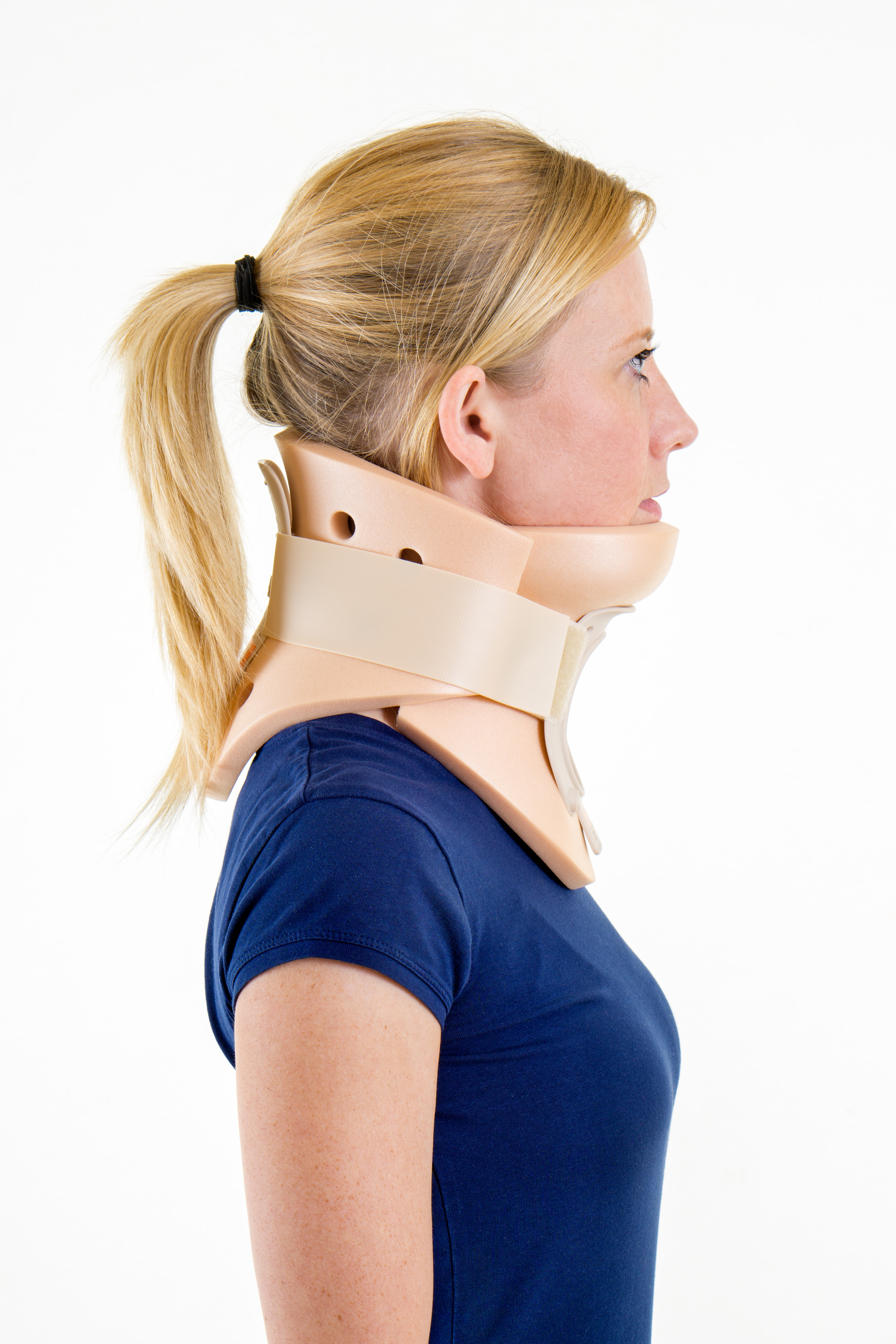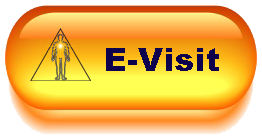Chronic/Pain Conditions >> Whiplash
 To Request an Action Plan to address Low Back Pain Click Here
To Request an Action Plan to address Low Back Pain Click Here
To attend a FREE Class on this topic, Click Here
In this video, Dr. Huntoon discusses if having symptoms should ever be tolerated.
Having Whiplash is very common, but if not properly addressed, it can lead to degenerative neck concerns you do not want to have.
When you are tired of the pain and want to get back to life, Dr. Huntoon is here to help.
![]() To Request an Action Plan to
To Request an Action Plan to
Address Whiplash Click Here
Whiplash
Whiplash is a non-medical term used to describe neck pain following an injury to the soft tissues of the neck (specifically ligaments, tendons, and muscles). It is caused by an abnormal motion or force applied to the neck that causes movement beyond the neck's normal range of motion. It is usually caused by a flexion-extension motion of the neck that pulls and strains the neck muscles and ligaments.
Whiplash happens in motor vehicle accidents, sporting activities, accidental falls, and assault.
Synonyms for whiplash include acceleration flexion-extension neck injury and soft tissue cervical hyperextension injury. A doctor may use the more specific terms of cervical sprain, cervical strain, or hyperextension injury.
Symptoms
 The symptoms of whiplash generally include some degree of neck pain and muscle stiffness. Depending on the severity of the injury, signs and symptoms may also include:
The symptoms of whiplash generally include some degree of neck pain and muscle stiffness. Depending on the severity of the injury, signs and symptoms may also include:
- tenderness along the back of the neck and shoulders,
- neck swelling,
- muscle spasms in the posterior cervical spine (back of the neck),
- anterior cervical spine (front of the neck), or
- in the trapezius muscles (back of the shoulders),
- difficulty flexing,
- extending, or
- rotating the head,
- headache,
- difficulty concentrating,
- sleep disturbances, and/or
- fatigue,
- jaw tightness or difficulty chewing, and cases of severe whiplash
- vision disturbances,
- tinnitus (ringing in the ears), and other signs of nerve irritation
Causes
Strains of the neck from sudden changes in direction, for example,
- roller coasters,
- minor bicycle accidents, or
- slips and falls can all cause whiplash.
Whiplash can also be caused by repetitive stress injuries or chronic strain involving the neck (such as using the neck to hold the telephone) are common, non-acute causes.
The most frequent cause of whiplash is a car accident. The speed of the cars involved in the accident or the amount of physical damage to the car may not relate to the intensity of neck injury; speeds as low as 15 miles per hour can produce enough energy to cause whiplash in occupants, even when they wear seat belts.
Other common causes of whiplash include
- contact sport injuries and
- blows to the head from a falling object or being assaulted.
- Child abuse, particularly the shaking of a child, can also result in this injury as well as in more serious injuries to the child's brain or spinal cord.
Traditional Medical Treatment Options and Diagnosis
Whiplash Medical Treatment
 The medical treatment for whiplash depends on the severity of the injury. Severe neck injuries associated with bone or spinal cord damage may require surgical intervention. Less severe injuries are often limited to soft tissue injuries (muscles, ligaments, tendons) and treatment is directed at symptom relief.
The medical treatment for whiplash depends on the severity of the injury. Severe neck injuries associated with bone or spinal cord damage may require surgical intervention. Less severe injuries are often limited to soft tissue injuries (muscles, ligaments, tendons) and treatment is directed at symptom relief.
Your doctor may prescribe a treatment plan including Pain medications (over-the-counter or prescription). A cervical collar may be used for the first few days, but use should be limited to the time period prescribed. You will want to limit motion of the head and neck until pain and muscle tightness are gone, and especially limit strenuous activities such as sports or heavy lifting.
Cold packs or ice can be applied to the neck to minimize swelling and pain. Apply ice/cold to the neck area for 15-20 minutes. Repeat every hour, as needed, for the first 48-72 hours after the injury.
In extreme cases physical therapy with range of motion exercises, muscle strengthening, ultrasound, or electrical stimulation may be prescribed.
Whiplash Follow-up
Depending on the severity of the whiplash injury and the patient's response to treatment, follow-up care will recommended by the doctor as necessary. Follow-up care may include physical therapy, home exercises, or a visit to a specialist.
WHIPLASH PREVENTION
Prevention is the most effective way to avoid whiplash.
- Always using seatbelts and drive motor vehicles with airbags. Proper adjustment of the car seat headrest can also help keep the neck from snapping backwards.
- Always use the proper safety equipment when participating in sports.
- Follow amusement park or carnival safety instructions on high-velocity rides, such as roller coasters.
- Report suspected child abuse to authorities. Monitor children's activities to prevent falls or serious injuries.
Dr. Huntoon's Alternative Medical Treatment Options
Whiplash Non Medical Treatment: The BEST Option First
Non-traditional medical treatments such as chiropractic, massage, or acupuncture may be helpful for most, if not all patients in the treatment of whiplash. This should be considered first and may be done in conjunction with medical treatment.
Working with a Holistic Chiropractor who can help you to treat the misalignments that result from a whiplash injury is what will help the condition heal fastest. Supporting the body with proper nutrition using whole food supplements specific to help the ligaments, bones, tendons and discs to heal, in addition to anti-inflammatory fish oil, will be necessary to support the full healing and prevent long-term degeneration from occurring. This is probably the most important thing you can do right after the injury for the most complete and beneficial healing possible. The longer you wait for proper care, the less of a chance for full recovery. Dr. Huntoon has 27 years of experience helping people recover faster and more fully with the least amount of intervention.
What to Discuss with Your Doctor
As Whiplash most often occurs after some form of accident or trauma, you should always follow up with your Doctor after any accident. If you are treated at the scene emergency medical services (EMS) may place the patient in a cervical collar strapped around the neck, and on a backboard to stabilize the neck to prevent any further neurologic injury. In the emergency department, the doctor will remove the collar and board when appropriate, following the guidelines set forth in the National Emergency X-Radiography Utilization Study (NEXUS):
When you are examined the Doctor is going to be looking at the following qualities:
- Does the patient have a normal level of consciousness or alertness? The Doctor is going to want to make sure you are responding normally to stimulus and are not having difficulties concentrating, or remaining awake.
- Does the patent have any tenderness in the midline of the back of the neck? Tenderness in these areas can be indicative of whiplash, or other injury that may cause the doctor to investigate further.
- Does the patient have any evidence of intoxication with alcohol or drugs. Alcohol and drugs can impact how a patient responds. Additionally with an impaired mental or physical state the patient may not fully feel the full extent of their injuries.
- Does the patient have any muscle weakness or sensation problems, such as has lost physical strength in both arms and legs? The doctor is going to check to make sure your muscles are working normally.
- Does the patient exhibit a focal neurologic deficit? This means the doctor is going to make sure you have no problems with your nerves, spinal cord, or brain function. This is often tested by testing a patient's ability to sense the touching of the skin in different parts of the body and resting the reflexes in the joints of the arms and legs The Doctor will also examine looking for any other painful injury elsewhere on the body. A distracting injury may prevent you from feeling the whiplash, and the Doctor will be mindful of this while performing his examination.
The doctor will inspect the patient's head and neck for external signs of trauma including bruises, cuts, and abrasions. The patient's neck will be pressed in specific areas to be sure the patient does not perceive any pain or tenderness. The patient may be asked to move their neck in a controlled way to the left, right, up, and down. The patient should tell the doctor if they feel pain in the neck, numbness, or tingling in any of the arms or legs, or any other abnormal feelings during these maneuvers.
If the patient needs X-rays of the neck to make sure there are no fractures or signs of other serious injury, the collar will remain in place to stabilize the neck. If the patient's X-rays are normal, then the cervical collar will probably be removed, and the patient should not need any further X-rays. If the X-rays appear abnormal, further imaging with a CT scan or MRI may be ordered.
Prevention and Quick Tips
Whiplash Self-Care at Home
With whiplash it can be vital to see your Holistic Chiropractor to determine the severity of your condition early. After your examination your doctor will offer you instructions in regards to your injury on how best to help the healing process. For minor injuries or strains of the neck home care may be appropriate. However if there are any serious signs and symptoms as listed above, or evidence of any neurologic problems hospitalization may be required. If there is any question about the severity or treatment of a neck injury, see a chiropractor.
Home care for whiplash includes decreasing the painful symptoms of the strain. The symptoms of whiplash can be treated with the following home remedies:
- Cold packs or ice can be applied to the neck to minimize swelling and pain. Apply ice/cold to the neck area for 15-20 minutes. Repeat every hour, as needed, for the first 48-72 hours after the injury.
- If there is no pre-existing condition or contraindication to their use, over-the-counter pain medications can be used such as acetaminophen (Tylenol), ibuprofen (Advil, Motrin) or naprosyn (Alleve), and aspirin.
You should be careful to limit the motion of the head and neck until pain and muscle tightness are gone. While pain medication may mask the pain, and tightness it is still important to take care with the injured area. Avoid any strenuous activities such as sports or heavy lifting that may make the injury worse.
WHIPLASH PROGNOSIS
The prognosis (outlook) for recovery from whiplash depends on the severity of the injury. Minor whiplash injuries usually resolve within 1-2 weeks. Moderate whiplash injuries with muscle spasm or ligament strains may take up to 4-8 weeks to resolve.
Severe whiplash injuries, or those that involve nerve damage or ligament or disc injury to the spine, may result in chronic or permanent disability. These injuries may require future surgical intervention. Treatment with a Holistic Chiropractor is the best way to avoid the possibility of surgery and future arthritic neck problems.
More About AAMC
About Dr. Huntoon
When Your Health Matters
Click the link for a description of this week's show and a link to the podcast from:
Free Health Care Class Schedule
Classes start at 6: 30 pm
Classes are open to the public
You Must Call 845-561-2225
for reservations

Advanced Alternative Medicine Center
Serving All Your Heath Care Needs ... Naturally!
Dr. Richard A. Huntoon
Pooler Chiropractor
Newburgh Chiropractor

A winner of the 2015 Patients' Choice Awards in Chiropractic - Newburgh, NY
Verified by Opencare.com
Home | Chronic Health Concern | Specific Health Concern | My Child’s Health | Health and Wellness | New Patient Center | Other
Copyright © 2019 All Rights Reserved.






